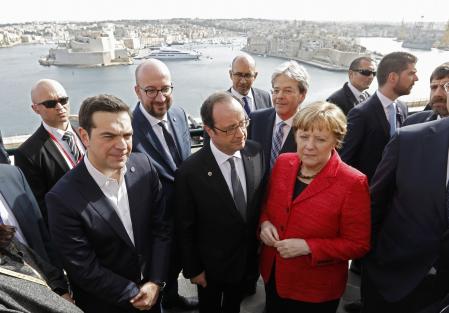
VALLETTA (Reuters) – German Chancellor Angela Merkel and leaders of other founding states of the European Union spoke on Friday of some countries moving ahead faster than others with further integration.
After a summit in Malta at which all national leaders discussed plans for a formal declaration in March on the future of the bloc following Britain’s departure, Merkel and others offered endorsements of a so-called “multispeed Europe”, which some governments fear could damage EU unity in the wake of Brexit.
Though they disagree on details, Berlin, Paris and many of the 17 other states which use the euro currency are keen to bind the euro zone closer together after years of crisis in which investors have doubted the currency’s survival. But some countries around the periphery of the bloc fear creating a system in which a hard core of states pushes the EU into policies they do not want.
The last few years, Merkel told reporters, showed “that there will be an EU with different speeds, that not everyone will take part in the same levels of integration”.
One area in which governments are divided over the degree of integration is defence. With the departure of long-time sceptic Britain, France and Germany are keen to develop closer EU ties.
The 27 leaders are due to meet without British Prime Minister Theresa May on March 25 in the Italian capital to celebrate the 60th anniversary of the founding Treaty of Rome.
French President Francois Hollande said he thought that the Rome statement could mention “several speeds” as a possible way forward, though he stressed: “European unity is essential.”
In a reminder of divisions in the bloc, Hollande, who will step down in May, took a dig at East European states which Paris complains fail to honour commitments — such as taking in asylum-seekers — while accepting big subsidies from Brussels:
“Europe isn’t a cash-box, not a self-service restaurant, a Europe where you come and take what you need, where you take your structural funds or get access to the internal market and then show no solidarity at all in return,” he told reporters.
“Europe was built to be stronger together and it’s that rule, that principle, which should be driven home in March.”
In a paper offering proposals for the Rome declaration, the three Benelux neighbours said “different paths of integration and enhanced cooperation could provide for effective responses to challenges that affect member states in different ways”.
(Reporting by Andreas Rinke, Elizabeth Pineau and Alastair Macdonald; Editing by Hugh Lawson)